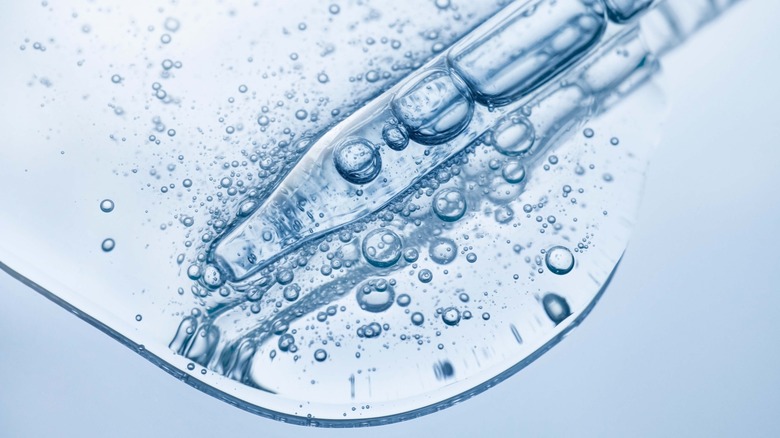What Are Peptides And What Can They Actually Do For Your Skin?
There's no shortage of ingredients in the skincare space that claims to be the next big thing. It's like there's a constant stream of products that promise dramatic results, only for them to be pushed aside once yet another shiny new ingredient comes along.
We've seen it happen with hyaluronic acid serums that promise to deliver intense hydration and keep your skin soft and bouncy, or glycolic acid that's touted for its gentle exfoliation of the skin and brightening of dark spots and hyperpigmentation. There's no question that these two ingredients are still revered by many, but they no longer comprise the bulk of Instagram feeds, nor are they often featured as a star ingredient in newer products in the market. The new popular ingredient on the block? The baton has been passed to peptides, which supposedly facilitate collagen production, making your skin more elastic. As a result, fine lines are less noticeable, pores appear smaller, and your skin looks less inflamed.
But as with all buzzworthy skincare ingredients, people rarely take the time to understand what they are, how they work, and what they really do for your skin. If you're going to introduce a new product in your skincare routine, it's important to dive into the nitty-gritty so you know if it can address your specific concerns and contribute to your end goal. Considering adding peptide products to your skin regimen? Here's a quick primer.
What are peptides and how do they work?
Understanding what peptides are requires taking a trip down memory lane — specifically to your high school chemistry class. At their core, peptides are what make up proteins, but reducing them to that is ignoring the fundamental science behind them. Technically, peptides are chains that form proteins that when broken down further, are blocks of amino acids.
"Peptides often act as little biological messengers, carrying information from one cell to another," dermatologic surgeon Dr. Antony Nakhla explained to Vanity Fair. "The function that a specific peptide carries out is dependent on the types of amino acids involved in the chain and their sequence, as well as the specific shape of the peptide." In a nutshell, peptides tell your body what it needs, and the body will act according to the specific message the peptides provide. And so, for instance, if you are applying a peptide on your skin intended to ramp up collagen production, it can help your skin combat premature aging.
While peptides are already present in the body, dermatologist Dr. Deanne Mraz Robinson told Demstore that our body's ability to carry out messages wanes as we age. "We lose 1% of our remaining collagen per year after age 30," she shared, adding that when peptides enter the body through topical treatments like creams and serums, they "trick the skin into thinking there's been an injury or wound, and it stimulates our collagen-boosting processes."
How peptides can put a little pep in your skin
Since peptides are able to convince your skin to do all sorts of things, they can do wonders in improving your overall complexion. They thrive, however, in the realm of anti-aging, as they're known to reduce the appearance of fine lines and wrinkles, protect your skin from the harmful effects of UV rays, make the skin firmer, and even boost hydration. Youngsters need not include peptides in their respective skincare regimens, but those over 30 may benefit from what they can deliver, per board-certified dermatologist Dr. Lian Mack. "Using peptides in a nightly skincare routine helps the skin repair itself from environmental stressors encountered during the day and function to slow down the [aging] process," she told InStyle.
In many ways, peptides help in maintaining your youth. While it can't permanently turn back the hands of time, peptides do a great deal in maintaining your skin's appearance. They also make for a great alternative if your skin has a tough time acclimating to products like retinol. "Peptides are ideal for anyone seeking a targeted treatment to address the first signs of sagging, loss of firmness, stubborn expression lines, crow's feet, and forehead lines, but you don't have to wait until you see those things to start using them," Deborah Kilgore, global director of skin care knowledge for Paula's Choice told The Zoe Report. "Adding peptides to a routine now will help preserve a more youthful appearance longer."


